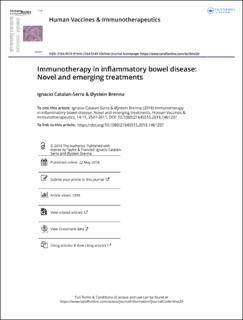| dc.contributor.author | Catalan-Serra, Ignacio | |
| dc.contributor.author | Brenna, Øystein | |
| dc.date.accessioned | 2023-05-23T11:26:59Z | |
| dc.date.available | 2023-05-23T11:26:59Z | |
| dc.date.created | 2019-01-15T10:19:24Z | |
| dc.date.issued | 2018 | |
| dc.identifier.issn | 2164-5515 | |
| dc.identifier.uri | https://hdl.handle.net/11250/3068673 | |
| dc.description.abstract | Inflammatory bowel disease (IBD) is a chronic disabling inflammatory process that affects young individuals, with growing incidence. The etiopathogenesis of IBD remains poorly understood. A combination of genetic and environmental factors triggers an inadequate immune response against the commensal intestinal flora in IBD patients. Thus, a better understanding of the immunological mechanisms involved in IBD pathogenesis is central to the development of new therapeutic options. Current pharmacological treatments used in clinical practice like thiopurines or anti-TNF are effective but can produce significant side effects and their efficacy may diminish over time. In fact, up to one third of the patients do not have a satisfactory response to these therapies. Consequently, the search for new therapeutic strategies targeting alternative immunological pathways has intensified. Several new oral and parenteral substances are in the pipeline for IBD. In this review we discuss novel therapies targeting alternative pro-inflammatory pathways like IL-12/23 axis, IL-6 pathway or Janus Kinase inhibitors; as well as others modulating anti-inflammatory signalling pathways like transforming growth factor-β1 (TGF-β1). We also highlight new emerging therapies targeting the adhesion and migration of leukocytes into the inflamed intestinal mucosa by blocking selectively different subunits of α4β7 integrins or binding alternative adhesion molecules like MAdCAM-1. Drugs reducing the circulating lymphocytes by sequestering them in secondary lymphoid organs (sphingosine-1-phosphate (S1P) receptor modulators) are also discussed. Finally, the latest advances in cell therapies using mesenchymal stem cells or engineered T regs are reviewed. In addition, we provide an update on the current status in clinical trials of these new immune-regulating therapies that open a new era in the treatment of IBD | en_US |
| dc.language.iso | eng | en_US |
| dc.publisher | Informa UK Limited | en_US |
| dc.rights | Attribution-NonCommercial-NoDerivatives 4.0 Internasjonal | * |
| dc.rights.uri | http://creativecommons.org/licenses/by-nc-nd/4.0/deed.no | * |
| dc.title | Immunotherapy in inflammatory bowel disease: Novel and emerging treatments | en_US |
| dc.title.alternative | Immunotherapy in inflammatory bowel disease: Novel and emerging treatments | en_US |
| dc.type | Peer reviewed | en_US |
| dc.type | Journal article | en_US |
| dc.description.version | publishedVersion | en_US |
| dc.source.pagenumber | 2597-2611 | en_US |
| dc.source.volume | 14 | en_US |
| dc.source.journal | Human Vaccines & Immunotherapeutics | en_US |
| dc.source.issue | 11 | en_US |
| dc.identifier.doi | 10.1080/21645515.2018.1461297 | |
| dc.identifier.cristin | 1656864 | |
| dc.relation.project | Norges forskningsråd: 223255 | en_US |
| cristin.ispublished | true | |
| cristin.fulltext | original | |
| cristin.qualitycode | 1 | |

